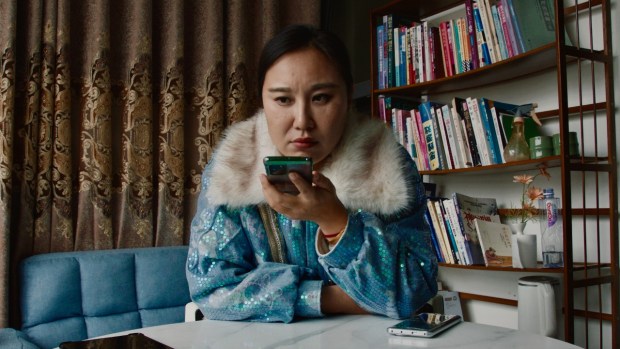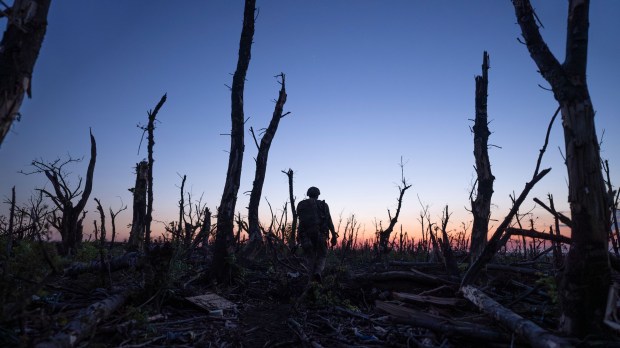The 10th edition of Doc10, Chicago’s annual long weekend of nonfiction filmmaking from well, everywhere, opens with something from here: “Move Ya Body: The Birth of House,” a Sundance Film Festival premiere earlier this year. It examines a dubious origin story with a delayed happy ending, about Comiskey Park’s notorious, literally inflammatory Disco Demolition night in 1979 and how a Major League Baseball-sponsored joke turned into a riot — and lit the fuse for the global phenomenon of South Side Chicago house music.
A 10-film showcase can do only so much, yet Doc10 does a lot each year, taking the pulse of our world as seen through the cameras of mavericks on a mission.
In this year’s crop, one film was shot under fire in Ukraine after the Russian invasion (“2000 Meters to Andriivka”), while another follows the nerve-wracking trail of a whistleblower targeted for assassination (“Antidote”). Closer to home, you’ll find a cautionary tale of a Florida woman who’s both perpetrator and, in her eyes, victim (“The Perfect Neighbor”).
Doc10’s home base remains the Davis Theater in Lincoln Square and, for two screenings on May 4, the Gene Siskel Film Center. Preceding the main lineup, several free community screenings pop up this week around Chicago. Doc10 is presented once again by the nonprofit documentary funding and producing organization Chicago Media Project. And head programmer Anthony Kaufman is responsible for what you’ll be seeing.
The New York City native is also a senior programmer at the Chicago International Film Festival; an adjunct professor at DePaul University specializing in documentary film; and a longtime film critic and journalist, focusing on nonfiction work. In recent years, Kaufman, 53, has written for Indiewire and other outlets about the stiff headwinds nonfiction filmmakers face. Netflix, Hulu and others now favor a fatty, low-protein diet of true crime and celebrity profile quickies. In the public sector, meantime, the Trump administration has targeted the National Endowment for the Arts, the National Endowment for the Humanities and the Corporation for Public Broadcasting for elimination.
“It’s hard, and maybe not sustainable,” Kaufman told me in our conversation the other day, on his back patio near Northwestern University. He’s married to associate professor Ariel Rogers, who teaches in the Northwestern School of Communication’s Radio/Television/Film department. On the other hand, Kaufman says: “It’s never been sustainable. Yet these filmmakers somehow find a way.”
The following has been edited for clarity and length.
Q: At a pretty bizarre time in American life and politics, and with stories of global conflicts with no endings in sight, what can the documentary genre give us?
A: One thing documentaries can do, I think, especially documentaries about current crises, is give us the long view. Or the deep view, the one we’re not getting from sound bites, or YouTube videos, or the administration’s statements. When you see a film like “2000 Meters to Andriivka” that puts you on the front line, in Ukraine, you understand what’s happening. You understand the stakes. You get a deeper, more substantive view that is not manipulate-able by propaganda. In this case, the filmmaker (Mstyslav Chernov, who will introduce the May 4 screening at the Siskel Film Center) was on the front lines with the soldiers, in the middle of firefights, risking his life.
With Doc10, over the last decade, we’ve built an audience that’s passionate about so many issues. And they’re eager to hear the filmmakers come and talk about them.
Q: Is it my imagination, or are we living in a moment when every single day, there’s another five potential subjects for a full-length documentary, crying out to be made?
A: That’s how it feels, all right. There’s a major event that happens, like the Luigi Mangione assassination of the UnitedHealthcare CEO Brian Thompson, and two weeks later, you see the documentary on Hulu. Maybe terrible and certainly sensational, but there it is.
Q. Of the 10 documentaries you picked this year, who’s working in more unconventional storytelling form?
A: I’d say two, in different ways. One is “Mistress Dispeller,” made by the Chinese American filmmaker Elizabeth Lo, who we’re bringing in (for the May 4 screening). In the film, she goes to China and tells the story of these people who are hired to break up husbands cheating on their wives with their mistresses. Nothing is fiction, nothing is staged, but the film puts us in real time with the mistress dispeller, working with this husband and wife. She’s been hired by the wife to bring her husband back, to convince him to end this affair. And she’s also working on the mistress to convince her to leave this married man. So it feels like a drama, a fiction film.
The other one is called “Ghost Boy,” by the director of “Room 237,” Rodney Ascher, who works with a really innovative use of reenactments. It’s about a 12-year-old who fell into a coma for three years and woke up with “locked-in syndrome.” He couldn’t communicate with the outside world, but he was fully conscious. And with these surreal visual reenactments, the film puts you in his headspace during that time. It’s using fictional storytelling techniques to tell this guy’s story.

Q: When a documentary hits a moment right, is it just lucky timing or something more?
A: It can be both. You remember “Won’t You Be My Neighbor?”, the Morgan Neville doc (from 2018, a huge hit) about Fred Rogers? That could’ve been made any time, or released any time, but it came out in the middle of the first Trump administration, at a point when America really needed the reminder that goodness and compassion were good things. Through sheer coincidence of timing, it was exactly the right moment.
This year, it may be “The Perfect Neighbor” (picked up for streaming rights by Netflix) that does something similar. It cuts to the bone of the current racial conflicts and questions, battles, really, over diversity, equity and inclusion, but in an indirect way.
Q: What are documentary filmmakers up against now that they weren’t a few years ago, in terms of getting their work out into the world?
A: Filmmakers and documentary producers I’ve talked to started to worry about shifts a year or two ago. Before that shift, it was a kind of golden age, when a lot of streamers put a lot of money into documentaries. Netflix, Hulu, Amazon. It was a kind of golden age, right during COVID.
Then the streaming companies realized what was doing well, according to their algorithms. True crime and celebrities. That’s what got the eyeballs. And now, virtually all of the attention is on that. And everything else, they leave out. This has not helped documentary filmmakers who don’t want to make a movie about Katy Perry in space.
So that’s been a struggle. And now we have the gutting of the NEA and the NEH, which a lot of filmmakers and funders relied on for making their work. The threat to public media, to PBS, is a threat to both the financing and the release of documentary filmmaking. It’ll be catastrophic for independent documentaries and independent media, period, across the country.
Q: As someone whose life’s work is so tied to this art form, do you ever give up hope?
A: The whole ecosystem is changing, and it’s hard. And maybe not sustainable. But I take heart from two things. One is, it’s never been sustainable (laughs). And the second thing is: Artists create, no matter what. Someone told me — maybe it’s a famous quote, I’m not sure — that optimism is a political tool. (Futurist Alex Steffen said something like it: “Choosing and voicing optimism is a powerful political action.”) I think we need to take heart from that. It’s disadvantageous for us to absorb defeatism.
Think of all the great art, the great films, that came out of crisis and political oppression. Film and art find a way. And documentary filmmakers are not a privileged bunch. They’ve never needed much. Unlike the fiction film industry, which is far more capital intensive, documentary filmmakers are, by nature, scrappy and determined and not really pressured by the market. They tell stories because they feel like they have to. And as you said, every day, there’s another incredible documentary subject, waiting for the right filmmaker.
We’ll see what we see, a year or two from now.
Doc10 film festival runs through May 4 at the Davis Theater, 4614 Lincoln Ave., and Gene Siskel Film Center, 164 N. State St.; more information at Doc10.org
Michael Phillips is a Tribune critic.



